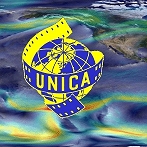
UNICA 2015
General Assembly
Page 2
Committee Members Attending
Georges Fondeur (President)
Jeanne Glass (Vice-President)
Jan Essing (Secretary General)
Thomas Kräuchi (Treasurer)
Advisers:
Zeljko Balog
Wolfgang Freier
Rolf Leuenberger
Rolf Mandolesi
Alois Urbanek
Also Present
Max Hänsli (Honorary President)
Fred Graber (Friends of UNICA)
Wolfgang Freier (UNICA Patronage)
Serge Michel (IFTC Liaison)
Nina Saitseva (Congress President)
Alois Urbanek (Technical Issues)
Dave Watterson (Webmaster)
Not Present
Artashes Hovanessian (Adviser)
Claire Auda (Translations)
Federations Represented
Austria
Belgium
Bulgaria
Croatia
Czech Republic
Estonia
France
Germany
Hungary
Italy
Liechtenstein
Luxembourg
Macedonia
Netherlands
Norway
Poland
Republic Of Korea
Romania
Russia
Slovakia
Spain
Switzerland
Tunisia
United Kingdom
11. Report of "Friends of UNICA"
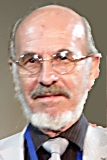 Georges
Fondeur (president): The report was prepared by Fred
Graber and dispatched to the federations. (Read
it as a pdf here.)
Georges
Fondeur (president): The report was prepared by Fred
Graber and dispatched to the federations. (Read
it as a pdf here.)
UNICA friends met here in Saint Petersburg. It was a nice meeting,
where Fred Graber presented beautiful pictures of the Committee
meeting in Suceava.
The report is approved unanimously, with thanks and applause to Fred Graber.
12. Report on UNICA Patronages
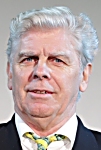 The
report was prepared by Wolfgang Freier and
dispatched to the federations. (Read
it as a pdf here.)
The
report was prepared by Wolfgang Freier and
dispatched to the federations. (Read
it as a pdf here.)
Wolfgang Freier (patronages) You all have seen that the name of the Festival in South Korea was not correct. There is an improved version of the list available in the website.
The report is approved unanimously, with thanks and applause to Wolfgang Freier.
13. Report of the delegate to I.F.T.C.
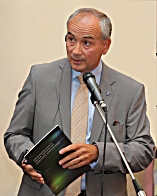
The author of this report is Serge Michel. The report was dispatched in three languages to the federations. (Read it here.)
Serge Michel (IFTC Liaison) this year is the 70th anniversary of UNESCO. The UNICA Congress is an important event in Saint Petersburg. There is a special prize, Prix Delmiro de Caralt with the picture of Fellini on it, which was created in 2008 on the occasion of the 50th anniversary of IFTC. UNICA may pass this prize to a filmmaker that best expresses the values of UNESCO: tolerance and communication between peoples.
Georges Fondeur (president) thanks Serge Michel for his work as vice-president of IFTC and liaison between UNICA and UNESCO. The report is approved unanimously, with thanks and applause to Serge Michel.
Part 1
- Opening address by the President of the Congress
- Federations / Representative / Deputies
- AGM Organisation
- Confirmation of the agenda
- Address by the President of UNICA
- Vote on the proceedings of the General Assembly UNICA 2014 in Piestany (SVK)
- Report of the Committee by the Secretary General
- Report of the Treasurer
- Report of the Auditors
- Report of the Film Librarian
Part 3
- Election of a new auditor
- Admission and resignation of members
- Discussion and vote about proposals of the Committee
- Discussion and vote about proposals submitted by members
- Determination of next year's contribution
- Confirmation of the budget
- Selection of the place and dates of the congress in future years
- Farewells
- Miscellaneous, without vote
Links
Report
of the Webmaster (as pdf)
14. Report regarding UNICA Web
Georges Fondeur (president) expresses his gratitude to Dave Watterson, who has been our web-master for the last year.
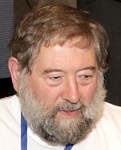 Dave
Watterson (webmaster): seizes the chance to thank the
interpreters, who are doing a wonderful job in interpreting the
congress so far. He adds that most of the reports for this GA are
already online and the Minutes will be online as soon as they are
ready.
Dave
Watterson (webmaster): seizes the chance to thank the
interpreters, who are doing a wonderful job in interpreting the
congress so far. He adds that most of the reports for this GA are
already online and the Minutes will be online as soon as they are
ready.
In the UNICA NEWS website many of the films we have seen this week will be online next week. This has been done by the authors voluntarily so their copyrights are not violated.
The report (read it here) is approved unanimously, with thanks and applause to Dave Watterson.
15. Discharge of the Committee
The auditors already proposed to discharge the Committee in the report, read by Nico Sauber (LUX). This proposal is accepted unanimously.
Georges Fondeur (president) thanks his fellow members of the committee.
16. Modification of the Statutes
Georges Fondeur (president) explains the suggested modification of the statutes. The work of the President isn’t decreasing. There are always a few people in the Committee who take on most of the jobs that must be done. He mentions as example Wolfgang Freier, who visits most patronage festivals, but even Wolfgang cannot be everywhere at the same time. The President himself experienced one weekend in 2014 the problem that he should attend three different events at the same time: firstly in Korea with the international video festival in Seoul, secondly in Fieberbrunn, Austria, at the 50th anniversary of the VÖFA and at the same time he was invited to the DAFF in Germany. Because he had long before promised Alois Urbanek to visit the VÖFA anniversary, he unfortunately had to miss the two other events.
Furthermore it will remain difficult for the future President to make any commitments without much effort, because he does not live near an international airport.
Therefore, the Committee has proposed that the General Assembly permits a second Vice President at executive level. To avoid any increase in costs the Committee took the opportunity to reduce the number of advisors if necessary. Even if in future fewer candidates than today present themselves, the Committee can work with “3 to 7 advisors”. All is now proposed as a modification of the statutes. (Read the proposed wording here.)
A 2/3 majority is required (equals 17 votes) to accept the proposal.
Max Hänsli (LIE & Honorary President) stresses that there have been two vice-presidents before to represent the Eastern and Western European States in the Committee. After peace came to Europe this was abandoned.
Furthermore Max Hänsli reports that he has contacted the Liechtenstein Association because of this modification of the statutes. The Liechtenstein Association asked him to question the constitutional amendment with the same arguments as Max previously discussed. If the President had explained in detail the proposal when it was sent out, then the question would probably have not occurred. In any case, Max is of the opinion that the distribution of work between the various offices within the Committee must be clearly established.
Georges Fondeur (president): that is exactly what the new Committee will do. The distribution of work nevertheless doesn’t diminish the extent of the work. The renovation work must be distributed to many shoulders.
Bernhard Zimmermann (DEU) thinks that the Statutes must not limit the organisation too much. A good distribution of the work within the Committee must not be set in the statutes and certainly not a division between the “East” and “West”. The Statutes have to set minimal restrictions.
Georges Fondeur (President) indicates that “one or two” is proposed. It is not necessary to always have two vice-presidents, but the possibility is created with this amendment of the statutes.
Emil Mateias (ROU): the Romanian delegation agrees with the possibility to have two Vice Presidents. We need to deal with the future and if a VP can deal with the youth, that would be ideal.
Georges Fondeur (President) puts the possibility of having two vice-presidents to the vote first. 19 votes in favour, LIE, TUN, ITA, HUN abstain and there are two votes against. The proposal is thus adopted.
The next proposal to allow “3 to 7” advisors (instead of 5 to 7) is adopted with a unanimous 25 votes.
17. List of candidates for members of the Committee
Georges Fondeur (president) the (mostly new) candidates should have the opportunity to introduce themselves. The list was sent to the federations and we start with the candidates for the executive Committee. (Read about the candidates here.)
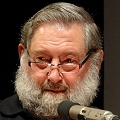 Dave
Watterson (candidate for president) My parents taught me
to give something in return to organisations, of which I was a
member. I do not particularly want to be president of UNICA, but I
want UNICA to be an organization that prospers year after year. And
that has been under threat. ARM and FRA wanted to turn UNICA into
just one more international film festival. There are thousands of
those festivals around the world. UNICA is unique Our purpose is (as
well as the competition) to organise a congress, which literally
means: “bringing people together” to talk and discuss together,
meet, eat and drink together. It is an (admittedly small) step
towards peace to the world, which is why UNESCO supports us. But
there is another threat. When UNICA started it was a bunch of
younger people with enthusiastic ideas and I think we lost some of
that energy during the last decades. I want to bring that enthusiasm
back into UNICA with the help of the new committee. Bring film back
to the top of all hobbies.
Dave
Watterson (candidate for president) My parents taught me
to give something in return to organisations, of which I was a
member. I do not particularly want to be president of UNICA, but I
want UNICA to be an organization that prospers year after year. And
that has been under threat. ARM and FRA wanted to turn UNICA into
just one more international film festival. There are thousands of
those festivals around the world. UNICA is unique Our purpose is (as
well as the competition) to organise a congress, which literally
means: “bringing people together” to talk and discuss together,
meet, eat and drink together. It is an (admittedly small) step
towards peace to the world, which is why UNESCO supports us. But
there is another threat. When UNICA started it was a bunch of
younger people with enthusiastic ideas and I think we lost some of
that energy during the last decades. I want to bring that enthusiasm
back into UNICA with the help of the new committee. Bring film back
to the top of all hobbies.
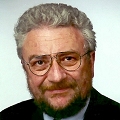 Bernhard
Lindner (candidate for vice-president): you know me
perhaps as president of the jury for several years, because it is
one of my passions to watch movies and to talk about movies.
Therefore I was not able to mingle among the festival audience.
You’ve read, thanks to Dave Watterson, my curriculum vitae on the
internet. I was born in 1946 and worked until some years ago at
German Railways as a Manager in the field of data processing and
organisation. I have made films since 1960-1961. For some years now
I'm in a team to redesign the German federation BDFA to
provide young filmmakers with more opportunities. UNICA also could
use some changes, but in the form of evolution, rather than
revolution. Maybe one can make the congress slightly less expensive,
so that even less wealthy people can have better access.
Furthermore, I want to improve the communication with the member
countries, not only from the Committee to the countries but also
from the countries to the Committee (not only during the Congress)
to know what hurts us and what pleases us. Let us start!
Bernhard
Lindner (candidate for vice-president): you know me
perhaps as president of the jury for several years, because it is
one of my passions to watch movies and to talk about movies.
Therefore I was not able to mingle among the festival audience.
You’ve read, thanks to Dave Watterson, my curriculum vitae on the
internet. I was born in 1946 and worked until some years ago at
German Railways as a Manager in the field of data processing and
organisation. I have made films since 1960-1961. For some years now
I'm in a team to redesign the German federation BDFA to
provide young filmmakers with more opportunities. UNICA also could
use some changes, but in the form of evolution, rather than
revolution. Maybe one can make the congress slightly less expensive,
so that even less wealthy people can have better access.
Furthermore, I want to improve the communication with the member
countries, not only from the Committee to the countries but also
from the countries to the Committee (not only during the Congress)
to know what hurts us and what pleases us. Let us start!
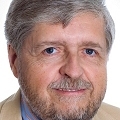 Georg
Schörner (candidate for secretary-general): UNICA is
celebrating its 85th anniversary next year if we include the initial
activities. This is nice but also linked to problems because very
long-lived institutions easily become set in their ways with
recurring activities.
Georg
Schörner (candidate for secretary-general): UNICA is
celebrating its 85th anniversary next year if we include the initial
activities. This is nice but also linked to problems because very
long-lived institutions easily become set in their ways with
recurring activities.
I originally applied as adviser and successor to Alois Urbanek. I got signals that I could be useful to UNICA as secretary-general and then extended my application to G-S.
I was born in 1951 and worked professionally as a Director of a Research Institute in the field of environment and as a co-founder of a scientific Academy. I have made films since 1967 and joined the Board of Directors of VÖFA in 1976 and was secretary-general of the Association for 19 years. I would like to dedicate myself to UNICA with five aims:
- UNICA as an organisation should be distinguished better from UNICA as a Congress.
- We should consider how the Festival can be easily changed to optimise it and make it attractive to new audiences
- We can improve internal communication (also with the Member States);
- Perhaps, we need to consider afresh the roles of amateurs, film school / Academy and young professionals;
- How to use the UNICA archive better?
I thank you in advance for your support, if you believe that I can serve UNICA as General-Secretary in the next three years.
Georges Fondeur (president) proposes to vote for first for the posts of the officers: President, two Vice Presidents, General Secretary and Treasurer.
Nico Sauber (LUX) reads the results of the vote. Two ballots were invalid:
- Dave Watterson as president: 23 votes;
- Jeanne Glass as vice-president: 18 votes;
- Bernhard Lindner as vice-president: 20 votes;
- Georg Schörner as secretary-general: 23 votes;
- Thomas Kräuchi as treasurer: 23 votes.
Georges Fondeur (president) congratulates the newly elected people.
Georges Fondeur (president): we now come to the election of 7 new advisers to the Committee. So on the ballot you can tick a maximum of 7 names and every candidate has to achieve a minimum 13 votes to be elected. Candidates that gain the most ballots are elected first.
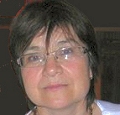 Tatyana
Alahverdzhieva (BGR): I've participated in many regional
festivals in Bulgaria and was also involved in the Organisation of
UNICA 2013 in Ruse. I know how to translate. I did that in Ruse. It
is a great honour for Bulgaria if I were to be part of the UNICA
Committee. I will serve the Committee and the people in UNICA as
well as I can.
Tatyana
Alahverdzhieva (BGR): I've participated in many regional
festivals in Bulgaria and was also involved in the Organisation of
UNICA 2013 in Ruse. I know how to translate. I did that in Ruse. It
is a great honour for Bulgaria if I were to be part of the UNICA
Committee. I will serve the Committee and the people in UNICA as
well as I can.
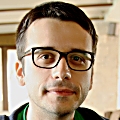 Mitze
Chapovski (MKD) introduces himself. The delegates may
know Mitze from the many UNICA congresses, he has visited. This is
the seventh. I've written quite a bit in the Web page, but can add
that it's a nice opportunity for me to represent Macedonia at the
Congress. I have made movies since I was seven years old. I came to
the Organisation of the International Film Festival in Skopje. Mitze
is a proponent of gradual change in UNICA. UNICA remains
fundamentally a non-commercial organisation. And its base is located
in the clubs in the member countries. Strong clubs make for strong
associations that in turn make a powerful UNICA. We must attract the
young generation of filmmakers and viewers to UNICA.
Mitze
Chapovski (MKD) introduces himself. The delegates may
know Mitze from the many UNICA congresses, he has visited. This is
the seventh. I've written quite a bit in the Web page, but can add
that it's a nice opportunity for me to represent Macedonia at the
Congress. I have made movies since I was seven years old. I came to
the Organisation of the International Film Festival in Skopje. Mitze
is a proponent of gradual change in UNICA. UNICA remains
fundamentally a non-commercial organisation. And its base is located
in the clubs in the member countries. Strong clubs make for strong
associations that in turn make a powerful UNICA. We must attract the
young generation of filmmakers and viewers to UNICA.
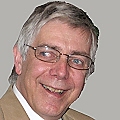 Jon
Gisle (NOR) unfortunately is absent due to a professional
Congress. Dave Watterson represents him. He is a
maker of experimental films, was a long-time president of the
National Association NSFF in Norway and is now an honorary member of
it. He would like to support with all his talents UNICA and all
filmmakers. He is a mainstay of the Eurofilmers. He hopes that the
assembly doesn't blame him not being here today.
Jon
Gisle (NOR) unfortunately is absent due to a professional
Congress. Dave Watterson represents him. He is a
maker of experimental films, was a long-time president of the
National Association NSFF in Norway and is now an honorary member of
it. He would like to support with all his talents UNICA and all
filmmakers. He is a mainstay of the Eurofilmers. He hopes that the
assembly doesn't blame him not being here today.
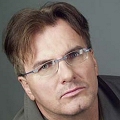 Pawel
Łęski (POL): everyone can witness the kind of work I
perform as a member of the jury at this festival, and also in
Blankenberge (BEL), Hammamet (TUN), and in Gdansk (POL). I got
involved in the Organisation of some (UNICA) Festivals in Poland. I
graduated from the University in Theatre Arts in Warsaw, and studied
in Germany and France. I have made films as a director, but mostly I
was a film actor in Poland, France and the United States. I am not
in the position to say what needs to be changed in UNICA. I'm going
to learn above all.
Pawel
Łęski (POL): everyone can witness the kind of work I
perform as a member of the jury at this festival, and also in
Blankenberge (BEL), Hammamet (TUN), and in Gdansk (POL). I got
involved in the Organisation of some (UNICA) Festivals in Poland. I
graduated from the University in Theatre Arts in Warsaw, and studied
in Germany and France. I have made films as a director, but mostly I
was a film actor in Poland, France and the United States. I am not
in the position to say what needs to be changed in UNICA. I'm going
to learn above all.
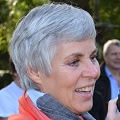 Franka
Stas (NLD) starts in French and German, but continues in
English. It's good to see that so many good candidates apply for
membership to the Committee. I've heard that each of us would like
to support UNICA. UNICA is regarded as a family. In a family, three
things are important:
Franka
Stas (NLD) starts in French and German, but continues in
English. It's good to see that so many good candidates apply for
membership to the Committee. I've heard that each of us would like
to support UNICA. UNICA is regarded as a family. In a family, three
things are important:
- love;
- history/experience;
- future.
I will never forget my first UNICA Congress in Luxembourg in 2002, because my film was in the Netherlands’ program. A documentary about Camille Claudel. I was surprised by the atmosphere which prevailed and learned that film is the universal language.
I offer my own experience in film education to young people. I started 41 years ago as a gym teacher but in the last 10 years I have given film classes.
As a family, in my opinion the heart of UNICA must be passed to the next generation. How should you redirect the UNICA spirit to young filmmakers? In a family, you share experience. And for that I want to make myself useful.
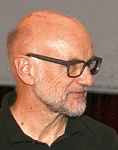 Rolf
Leuenberger (CHE) takes the floor. He tries to summarise
six years of membership of the Committee in six lines. He was well
prepared and full of urgency of action when he began his sporting
career in 2010 within the Committee. His main coach always whistled
him back and applied the brakes. Yet year after year he succeeded in
forming a jury team of a group of 7 individuals. It is also on his
initiative that the film archive was accommodated in Bern at the
Lichtspielhaus. Jeunesse is and remains a problem child in UNICA.
Rolf wasn’t allowed to change that. He came back to the
committee with five proposals last August, but was held back again.
Unfortunately, the majority of the members of the Committee remained
silent. He wishes all the new candidates in the Committee good luck
but withdraws his candidacy for the Committee.
Rolf
Leuenberger (CHE) takes the floor. He tries to summarise
six years of membership of the Committee in six lines. He was well
prepared and full of urgency of action when he began his sporting
career in 2010 within the Committee. His main coach always whistled
him back and applied the brakes. Yet year after year he succeeded in
forming a jury team of a group of 7 individuals. It is also on his
initiative that the film archive was accommodated in Bern at the
Lichtspielhaus. Jeunesse is and remains a problem child in UNICA.
Rolf wasn’t allowed to change that. He came back to the
committee with five proposals last August, but was held back again.
Unfortunately, the majority of the members of the Committee remained
silent. He wishes all the new candidates in the Committee good luck
but withdraws his candidacy for the Committee.
Georges Fondeur (president) is surprised by Rolf’s decision, because a new head coach will be in charge soon.
Rolf Leuenberger (CHE) sticks with his decision.
18. Election of the committee
Georges Fondeur (president): we now come to the election process. There are 8 candidates for seven posts. The ballot papers have been adapted to the new situation. Nico Sauber (LUX) reports that all ballot papers were valid. The result is as follows:
- Tatyana Alahverdzhieva (BGR): 19 votes;
- Zeljko Balog (HRV): 24 votes;
- Mitze Chapovski (MKD): 19 votes;
- Wolfgang Freier (DEU): 24 votes;
- Jon Gisle (NOR) 14 votes;
- Pawel Łęski (POL): 18 votes
- Rolf Mandolesi (ITA): 15 votes;
- Franka Stas (NLD): 19 votes
Georges Fondeur (president) thanks the scrutinisers . Unfortunately, only Jon Gisle (NOR) is not selected even though he has reached the simple majority.
As new president Dave Watterson wishes to direct a few words to the newly elected. He wants to thank the representatives on behalf of all members of the Committee for their trust. The Committee will do its best to continue UNICA. At the end of the General Assembly, the new Committee will assemble immediately to distribute the posts.
Georges Fondeur (president): it was agreed upon that the new Committee will take over at the end of the Congress.